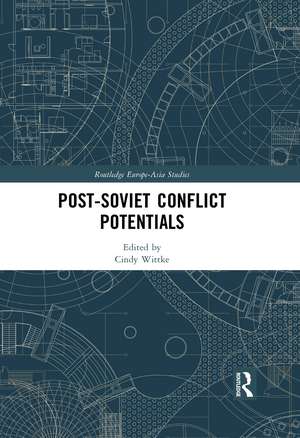Post-Soviet Conflict Potentials: Routledge Europe-Asia Studies
Editat de Cindy Wittkeen Limba Engleză Hardback – 18 aug 2022
Contributions coming from the disciplinary perspectives of international relations, international law, and comparative political science are linked to investigations dealing with international, transnational, regional and local levels of the dynamics between conflict and cooperation in the region. Despite the diversity of perspectives, the authors of this volume take a shared critical view on an alleged ‘New Cold War’ as their point of departure, observing that contemporary post-Soviet conflict potentials are produced through various discursive practices ranging from intentional choices of belligerent language to unintentional misinterpretations. The chapters in this volume seek to shed light on conflict potentials from different angles as well as on processes that increase or decrease the probability of political and violent conflicts in the post-Soviet region.
Together, the authors offer individual and shared outside-the-box approaches to the study of conflict dynamics and potentials in the post-Soviet space. The book draws connections to conflict potentials on the cross-regional and global levels, providing varied perspectives on what can be learned in and from the post-Soviet region.
The chapters in this book were originally published as a special issue of Europe-Asia Studies.
| Toate formatele și edițiile | Preț | Express |
|---|---|---|
| Paperback (1) | 389.66 lei 43-57 zile | |
| Taylor & Francis – 27 mai 2024 | 389.66 lei 43-57 zile | |
| Hardback (1) | 999.82 lei 43-57 zile | |
| Taylor & Francis – 18 aug 2022 | 999.82 lei 43-57 zile |
Din seria Routledge Europe-Asia Studies
-
 Preț: 332.72 lei
Preț: 332.72 lei -
 Preț: 311.41 lei
Preț: 311.41 lei -
 Preț: 383.33 lei
Preț: 383.33 lei - 16%
 Preț: 117.58 lei
Preț: 117.58 lei - 18%
 Preț: 1019.30 lei
Preț: 1019.30 lei -
 Preț: 389.22 lei
Preț: 389.22 lei - 16%
 Preț: 262.96 lei
Preț: 262.96 lei - 20%
 Preț: 259.98 lei
Preț: 259.98 lei - 17%
 Preț: 259.92 lei
Preț: 259.92 lei - 17%
 Preț: 183.77 lei
Preț: 183.77 lei - 12%
 Preț: 325.34 lei
Preț: 325.34 lei - 17%
 Preț: 215.19 lei
Preț: 215.19 lei - 17%
 Preț: 258.91 lei
Preț: 258.91 lei - 17%
 Preț: 268.18 lei
Preț: 268.18 lei - 12%
 Preț: 325.34 lei
Preț: 325.34 lei - 12%
 Preț: 299.52 lei
Preț: 299.52 lei -
 Preț: 370.71 lei
Preț: 370.71 lei - 12%
 Preț: 325.34 lei
Preț: 325.34 lei - 25%
 Preț: 553.44 lei
Preț: 553.44 lei -
 Preț: 393.03 lei
Preț: 393.03 lei - 17%
 Preț: 129.36 lei
Preț: 129.36 lei - 12%
 Preț: 299.52 lei
Preț: 299.52 lei - 25%
 Preț: 499.39 lei
Preț: 499.39 lei - 13%
 Preț: 324.86 lei
Preț: 324.86 lei - 12%
 Preț: 299.52 lei
Preț: 299.52 lei - 17%
 Preț: 250.96 lei
Preț: 250.96 lei - 26%
 Preț: 707.74 lei
Preț: 707.74 lei - 18%
 Preț: 1000.76 lei
Preț: 1000.76 lei - 25%
 Preț: 851.27 lei
Preț: 851.27 lei - 26%
 Preț: 766.12 lei
Preț: 766.12 lei
Preț: 999.82 lei
Preț vechi: 1219.29 lei
-18% Nou
Puncte Express: 1500
Preț estimativ în valută:
191.32€ • 200.25$ • 159.24£
191.32€ • 200.25$ • 159.24£
Carte tipărită la comandă
Livrare economică 31 martie-14 aprilie
Preluare comenzi: 021 569.72.76
Specificații
ISBN-13: 9781032304007
ISBN-10: 1032304006
Pagini: 152
Dimensiuni: 174 x 246 x 11 mm
Greutate: 0.44 kg
Ediția:1
Editura: Taylor & Francis
Colecția Routledge
Seria Routledge Europe-Asia Studies
Locul publicării:Oxford, United Kingdom
ISBN-10: 1032304006
Pagini: 152
Dimensiuni: 174 x 246 x 11 mm
Greutate: 0.44 kg
Ediția:1
Editura: Taylor & Francis
Colecția Routledge
Seria Routledge Europe-Asia Studies
Locul publicării:Oxford, United Kingdom
Public țintă
Postgraduate and UndergraduateRecenzii
"Wittke and her contributors shed new light on old problems by challenging worn-out perspectives on the post-Soviet region often rooted in cold-war terminology. Instead, they show that a much better understanding of conflict dynamics and potentials can be gained through in-depth empirical analysis. This collection offers a welcome inter-disciplinary corrective that complements, and in many ways takes us beyond, the "New Cold War" paradigm."
- Stefan Wolff, Professor of International Security, University of Birmingham
- Stefan Wolff, Professor of International Security, University of Birmingham
Notă biografică
Cindy Wittke is Leader of the Political Science Research Group at the Leibniz Institute for East and Southeast European Studies (IOS) in Regensburg (Germany) and PI of 'Between Conflict and Cooperation: The Politics of International Law in the Post-Soviet Space', a project funded by the German Federal Ministry of Education and Research (PolVR, 01UC1901).
Cuprins
Introduction: Post-Soviet Conflict Potentials 1. Conflict Over Peace? The United States’ and Russia’s Diverging Conceptual Approaches to Peace and Conflict Settlement 2. The Politics of International Law in the Post-Soviet Space: Do Georgia, Ukraine, and Russia ‘Speak’ International Law in International Politics Differently? 3. Evolving Dynamics of Societal Security and the Potential for Conflict in Eastern Ukraine 4. A Critical Political Cosmopolitanism for Conflict De-escalation: The Crimean Example 5. Accepting Alien Rule? State-Building Nationalism in Georgia’s Azeri Borderland Afterword
Descriere
Instead of resurrecting old images and nourishing new narratives about a ‘New Cold War’, Post-Soviet Conflict Potentials features politically and legally oriented critical investigations into conflict potentials and dynamics in the post-Soviet region and beyond.
